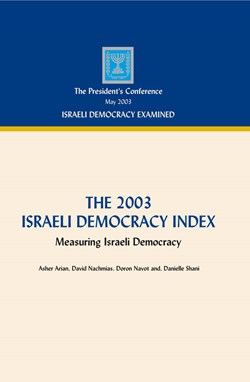The 2003 Israeli Democracy Index: Measuring Israeli Democracy
- Written By: Asher Arian, David Nachmias, Doron Navot, Danielle Shani
- Publication Date:
- Cover Type: Softcover
- Number Of Pages: 34 Pages
- Center: Viterbi Family Center for Public Opinion and Policy Research
- Price: 50 NIS
The findings of the 2003 Israeli Democracy Index indicate that Israel is largely a formal and unstable democracy, one that has not yet assumed the characteristics of a substantive democracy.
The Israeli Democracy Index Project was established to evaluate the quality and functioning of Israeli democracy by collecting quantified and comparable information that is comprehensive, precise, clear, reliable, and valid.We plan to conduct periodical evaluations of the state of Israeli democracy and to present the findings annually.The Israel Democracy Institute believes that the information presented here can contribute to the promotion of intense and informed public discourse regarding the state of Israeli democracy and lead to its reinforcement.
The 2003 Democracy Index Project was conducted on two levels: first, an examination of the state of Israeli democracy in terms of a series of indicators that attempted to measure the central aspects of the concept of democracy; second, an analysis of the state of democracy in Israel as it is reflected in public opinion. The public opinion survey's explicit goal was to examine the extent that democratic political culture has struck roots in Israel, and to check public perception of how Israeli democracy functions. Our intention was to examine the relation between the two; i.e., whether there is a disparity between the evaluation of the state of Israeli democracy according to the various indicators and the way the Israeli public perceives the state of democracy. In both categories—the indicators and the public opinion survey—Israel's status was examined from a comparative perspective. The analysis of the state of Israeli democracy was thus conducted on two comparative dimensions: Israel's situation compared to that of thirty-five other democracies in the world, and Israel's internal situation, as measured over the previous decade (1992-2003). Where available, data from as far back as 1969 was included in the public opinion category.
This research project is based on the assumption that democracy is a multi-dimensional phenomenon. Accordingly, the Democracy Index encompasses three main aspects: the institutional aspect, the rights aspect, and the aspect of stability and social cohesion. Addressing the formal and substantive sides of democracy respectively, the institutional aspect and the rights aspect are meant to include the content embedded in the concept of democracy. The third aspect, stability, is a characteristic of governments in general, not only of democratic regimes. Nonetheless, it seemed right to include it since its existence or absence influences the quality and functioning of democracy.
Each of these three aspects includes several characteristics that are important to a democratic regime. The institutional aspect includes five such characteristics: accountability, representativeness, participation, checks and balances, and governmental integrity (corruption). The rights aspect includes six characteristics: civil rights, political rights, social rights, economic (property) rights, gender equality and equality for minorities. The stability aspect includes three characteristics: stability of the government, the absence of political conflict, and the absence of social rifts. Each characteristic was examined by means of multiple (usually two) indicators, so that the research project includes a total of thirty-one indicators of the state of Israeli democracy. Thus, it can indeed be analyzed as a multi-dimensional phenomenon.
Likewise, in a representative sample of the adult population in Israel (Jews and Arabs), respondents were asked to what extent, in their opinion, each of the aforementioned characteristics is in fact realized in Israel. With regard to the characteristics that comprise the rights aspect, which express the substantive side of democracy, we examined the degree of support for those values among the general public in an attempt to measure the depth of democratic culture in Israel. The questions posed were included in a survey conducted in April 2003.
The public opinion data for comparison among countries were taken from international studies, mainly from The World Values Survey and The International Social Science Project. The indicators incorporated in the research were developed by various international research institutions, which also provided most of the data, primarily: Polity, Minorities at Risk, The United Nations Human Development Project, The International Institute for Democracy and Electoral Assistance, The International Country Risk Guide, Freedom House, Amnesty International, Transparency International, The Heritage Foundation, and researchers Arthur Banks, Michael Gallagher and Arend Lijphart.
This project surveys existing knowledge in the field of democracy evaluation, with the hope of including as wide a variety of indicators and information sources as possible. Those indicators that best met the following criteria were chosen: validity, reliability, sensitivity, transparency, clarity, specificity, availability of information, and the currency of the data.Unfortunately, in several cases we had to use indicators that did not fully conform to our criteria.
We present here a summary of the current state of Israeli democracy according to its ranking on various democracy scales, several detailed examples from among the indicators, and the main findings of the public opinion survey. The comprehensive data of the indicators and the democracy survey will be published in the near future.
Research Description and Objectives
The Democracy Indicators
The State of Israeli Democracy
The Institutional Aspect: Representativeness
The Institutional Aspect: Political Participation
The Rights Aspect: Political Rights
The Rights Aspect: Equality for Minoroties
The Stability Aspect: Governmental Stability
The Democracy Survey
Democratic Culture
Social Cohesion
Public Perceptions of Israeli Democracy

